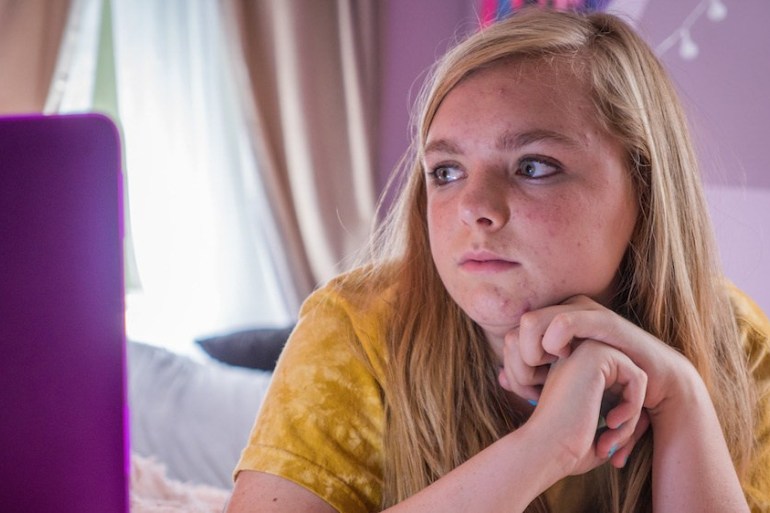Kayla Day (Elsie Fisher) may seem the most unlikely of protagonists for a film, but she is one of the most important and emotionally connecting female characters to grace the silver screen in recent memory. Played to near perfection by Fisher, Kayla is who first time director Bo Burnham chose in his debut, Eighth Grade.
Eighth grade is a time not many wish to revisit. The drama, stupid crushes, awkward bodies, it seems like one of the worst social times growing up. Not a time any interesting film could possibly come from, right? Walk into any given mall, and you will find a flock of head-down-phone-up teenagers sitting together, no words said between any of them; yet Burnham manages to make Eighth Grade one of the most insightful films in recent memory, chock full of emotion and important lessons for the protagonist and audience.
The film manages to not be “in your face” political. This is most prevalent in the school shooting drill scene. During the drill, Kayla has her first real interaction with her crush, Aiden (Luke Prael), who sells the dick teen perfectly. The scene is a shift for Kayla, a coming out of her shell moment. Burnham places this scene purposefully at this exact moment. The drill should be taken with seriousness and treated as a time that you wouldn’t go talk to a boy about nudes and oral, but this moment is that. Burnham shows the normalcy contemporary students treat school shootings now. The shooter drill is treated in the same vein as an earthquake or fire drill, and Burnham points out that this is NOT normal. This may be the best political statement I have seen in recent memory. It is not in your face but more nuanced and smart about what it is showing you. By not being political up front, it is political in the best way.
What Eighth Grade manages to explore so perfectly is a growing sense of disconnect and identity crisis endured by today’s youth. Burnham chose to write about an eighth grade girl because he felt they were the only ones still talking about their emotions. He captured that with Kayla. It wasn’t easy for her, however. Kayla can’t seem to hit the right beats with anyone her age, or anyone older for that matter. Her interactions with her father are all too real and genuine, and the (I may anger some here) “better than Mean Girls” interactions with her classmates burn with familiarity.
Kayla is a lost soul. She makes sweet and heartfelt YouTube videos that receive a handful of views, and we go on a ride with her as she attempts to figure herself out. There is all this tech and world out there promising a discovery of self, but what Kayla finds is a loss of identity within it. She finds in the film that others have lost themselves, too. And this is the point Burnham is trying to make or at least shed a light on. Our culture is going through a flurry of changes. Every day is a new tech or app that promises to bring us closer together, but as the past year has shown, we couldn’t be farther apart.
This point is made most clear in a mall scene with Kayla and her new high school friends. The high schoolers refer to her as being a part of a different generation and can’t seem to wrap their heads around the fact she had Snapchat in the fifth grade. Kids only a few years apart feel disconnected. People as a whole don’t even know what to do about the rapid speed at which the world seems to be moving, and Burnham doesn’t either. This film is his exploration of this confusing world, and he does so with a careful touch that few filmmakers have managed to achieve in recent memory.
Eighth Grade is Burnham’s beautiful and touching exploration into our modern society at large. Where we have seemed to have lost touch with each other, and more importantly, ourselves. Eighth Grade was certainly an exciting and delightful debut by Burnham and one that makes him a filmmaker to keep an eye on in the future.
Eighth Grade is out nationwide this weekend.


